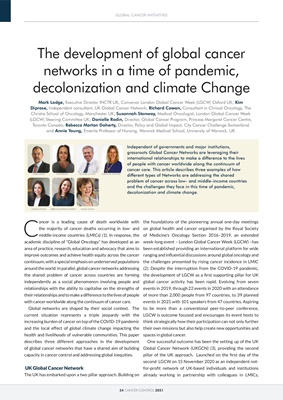
GLOBAL CANCER INITIATIVES
24 CANCER CONTROL 2021
The development of global cancer
networks in a time of pandemic,
decolonization and climate Change
Mark Lodge, Executive Director INCTR UK, Convenor London Global Cancer Week (LGCW) Oxford UK; Kim
Diprose, Independent consultant, UK Global Cancer Network; Richard Cowan, Consultant in Clinical Oncology, The
Christie School of Oncology, Manchester UK; Susannah Stanway, Medical Oncologist, London Global Cancer Week
(LGCW) Steering Committee UK; Danielle Rodin, Director, Global Cancer Program, Princess Margaret Cancer Centre,
Toronto Canada; Rebecca Morton Doherty, Director, Policy and Global Impact, City Cancer Challenge Switzerland
and Annie Young, Emerita Professor of Nursing, Warwick Medical School, University of Warwick, UK
C
ancer is a leading cause of death worldwide with
the majority of cancer deaths occurring in low- and
middle-income countries (LMICs) (1). In response, the
academic discipline of "Global Oncology" has developed as an
area of practice, research, education and advocacy that aims to
improve outcomes and achieve health equity across the cancer
continuum, with a special emphasis on underserved populations
around the world. In parallel, global cancer networks addressing
the shared problem of cancer across countries are forming
independently as a social phenomenon involving people and
relationships with the ability to capitalise on the strengths of
their relationships and to make a difference to the lives of people
with cancer worldwide along the continuum of cancer care.
Global networks are shaped by their social context. The
current situation represents a triple jeopardy with the
increasing burden of cancer on top of the COVID-19 pandemic
and the local effect of global climate change impacting the
health and livelihoods of vulnerable communities. This paper
describes three different approaches in the development
of global cancer networks that have a shared aim of building
capacity in cancer control and addressing global inequities.
UK Global Cancer Network
The UK has embarked upon a two pillar approach. Building on the foundations of the pioneering annual one-day meetings
on global health and cancer organised by the Royal Society
of Medicine's Oncology Section 2016-2019, an extended
week-long event - London Global Cancer Week (LGCW) -has
been established providing an international platform for wide
ranging and influential discussions around global oncology and
the challenges presented by rising cancer incidence in LMIC
(2). Despite the interruption from the COVID-19 pandemic,
the development of LGCW as a first supporting pillar for UK
global cancer activity has been rapid. Evolving from seven
events in 2019, through 22 events in 2020 with an attendance
of more than 2,000 people from 97 countries, to 39 planned
events in 2021 with 101 speakers from 47 countries. Aspiring
to be more than a conventional peer-to-peer conference,
LGCW is outcome focused and encourages its event hosts to
think strategically how their participation can not only further
their own missions but also help create new opportunities and
spaces in global cancer.
One successful outcome has been the setting up of the UK
Global Cancer Network (UKGCN) (3), providing the second
pillar of the UK approach. Launched on the first day of the
second LGCW on 15 November 2020 as an independent notfor-profit network
of UK-based individuals and institutions
already working in partnership with colleagues in LMICs,
Independent of governments and major institutions,
grassroots Global Cancer Networks are leveraging their
international relationships to make a difference to the lives
of people with cancer worldwide along the continuum of
cancer care. This article describes three examples of how
different types of Networks are addressing the shared
problem of cancer across low- and middle-income countries
and the challenges they face in this time of pandemic,
decolonization and climate change.
ANNIE YOUNG
DANIELLE RODIN REBECCA MORTON DOHERTY
RICHARD COWAN
MARK LODGE SUSANNAH STANWAY
KIM DIPROSE